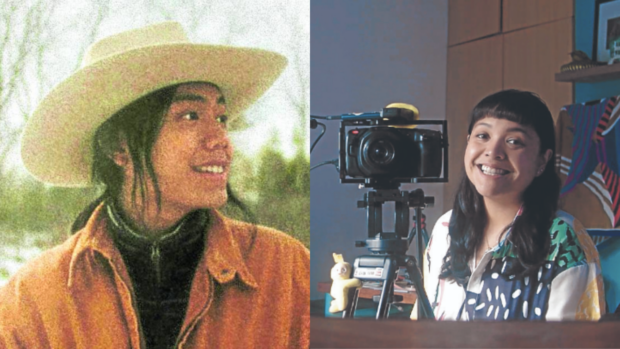2 Filipino indie films bag ‘historic’ wins at Sundance

Don Josephus Raphael Eblahan (left), director of ‘The Headhunter’s Daughter,” and Martika Ramirez Escobar, director of “Leonor Will Never Die.”
With two “historic” victories, the Philippines on Saturday marked its most successful outing yet at the prestigious Sundance Film Festival.
For her directorial debut, the film-within-a-film “Leonor Will Never Die,” Martika Ramirez Escobar was given the Special Jury Prize for Innovative Spirit at the World Cinema Dramatic section, making her the first Filipino feature film director to win at the festival, which was held online for the second year in the row.
Don Josephus Raphael Eblahan, meanwhile, earned the country’s first-ever Sundance win for a short film with “The Headhunter’s Daughter.” The dreamy, elegiac drama competed at the Shorts Program 4 section and took home the Grand Jury Prize.
8-year ‘labor of love’
“Leonor” is Escobar’s first feature film, taking eight years to complete. It follows a retired and ailing screenwriter, who, in her final days, turns into the action hero of the unfinished gangster movie she wrote, so she could experience her own work and make necessary edits. One of the festival jurors, La Frances Hui, commended the film for its “innovative and risk-taking spirit,” “constantly shifting tone” and its “playful display of the love for cinema.”
“Thank you so much for recognizing our team’s labor of love. This is special coming from what felt like a giant friendship film. Thank you to the entire Sundance team for treating us like family. I would like to thank those who showed their love and support for our film … [This is] proof that finally, after eight years, the movie is alive,” Escobar said in her acceptance speech at the online awards ceremony.
Article continues after this advertisementEscobar thanked her “amazing team,” her producers Monster Jimenez and Mario Cornejo, and her parents for “allowing me to become a filmmaker.” She also dedicated her win to her fellow young female filmmakers and all the “dreamers out there.”
Article continues after this advertisement“I’m like you, I’m with you. I hope this shines a bit of light on the difficult paths we have. I hope we all get to make the films we want to make in this life because we can,” she said.
Eblahan was caught off-guard by the win, so much so that he ended up wasting 20 seconds of his minute-long spot, because he couldn’t help but just gasp.
For Igorot identity
“However, after collecting myself, I recalled how immensely thankful I am to our tiny family of a team, who worked so hard on this film. I had to thank everyone I could fit in the time I had left … This news is so humbling and overwhelming, and I couldn’t wait to share the news to everyone,” he told the Inquirer.
“The Headhunter’s Daughter” follows Lynn (Ammin Acha-ur), an aspiring country artist from the Cordillera region who sets off on horseback to bustling Baguio City, where she auditions for a singing contest on TV. There she “traverses a postcolonial world and sees it through the eyes and perspective of a Filipino indigenous person.”
Eblahan, who’s of Ifugao Igorot and Visayan descent, hoped to use the film as a vehicle to “draw attention to Igorot identities, stories and bodies in our collective Filipino narrative.”
“Winning this award means that our stories do seem to resonate not just within ourselves, but to a much more vast international landscape,” he said. Shot amid the pandemic, the film was described by juror Blackhorse Lowe as “entrancing,” “poetic,” and having a “dream-like” quality. He also lauded the “gorgeous cinematography, direction, and acting,” which helped “capture a unique sense of place.”
“Something in the film resonated to folks outside of our region, cultural understanding and unique ethnographic identity,” Eblahan said. “And to realize that really warms my heart in such a profound way. I’m so deeply thankful for this win.”
Making the cut
Only a few other Filipino films have made the cut at Sundance. Aureus Solito’s “Ang Pagdadalaga ni Maximo Oliveros” (2005) and Sean Ellis’ “Metro Manila” (2013) also competed in the World Cinema Dramatic category. But while “Metro Manila” took home the audience award, it was written and directed by a British filmmaker.
Sonny Calvento’s “Excuse Me, Miss, Miss, Miss” was the first Filipino short film to make it into the festival’s shorts program last year.
Milestone
For the Film Development Council of the Philippines (FDCP), Escobar and Eblahan’s triumphs on Saturday should therefore be hailed as milestones. “The FDCP is incredibly proud of Philippines Cinema’s historic win at the Sundance … They’re writing history,” said FDCP chair Liza Diño-Seguerra in a statement.
Other Filipino-themed works screened at Sundance include the internationally produced documentaries “Imelda” (2004), “Motherland” (2017), and “A Thousand Cuts” (2020) — all by the award-winning Filipino-American documentary filmmaker Ramona Diaz.
Founded in 1978, Sundance is regarded as the largest independent film festival in the United States. This year’s event gathers a lineup of 84 feature films and 59 short films across different sections and categories.